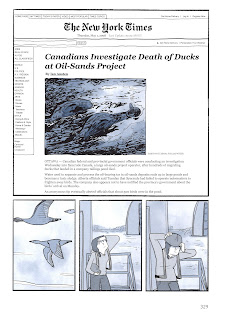Kate Beaton, Ducks: Two Years in the Oil Sands (Londres: Jonathan Cape, 2022). 430 páginas.
Cuando el sector
minero australiano estaba en su punto más álgido, en la primera década de este
siglo, recuerdo que uno de mis cuñados barajaba la idea de irse a trabajar al
oeste de Australia (la región de Pilbara, donde están las mayores minas de
hierro). El razonamiento era que en un año podía ganar lo que en su trabajo
normal le llevaría cuando menos cinco años. No se fue y nunca más volvió a
hablar de ello.
 |
| Cuando Kate vio la aurora boreal... (p. 131) |
 |
| Una aurora boreal a unos 11 000 metros de altitud en Canadá, captada en fotografía por Yevgeny Pashnin el 22 de enero de 2004. © Yevgeny Pashnin. |
Ducks es la autobiografía en formato de novela
gráfica de la experiencia de la canadiense Kate Beaton como trabajadora en las
explotaciones petrolíferas del norte de Canadá. Abarca casi tres años en
diferentes ubicaciones de Alberta. Beaton, oriunda de Nueva Escocia, decide probar
fortuna en las arenas petrolíferas para poder pagar su deuda estudiantil
rápidamente. Una mujer joven sin experiencia alguna en el campo industrial se
traslada a un lugar donde el sexismo y la misoginia son el pan nuestro de cada día
(casi he reemplazado esa palabra con otra: «hora»).
 |
| Una de esas fiestas... (página 209) |
Beaton ahonda en
la brutal sensación de aislamiento al tiempo que describe situaciones
surrealistas como la irrupción «por error» de tipos bebidos en su
dormitorio. Pero conforme avanza en su narración, el enfoque pasa a abarcar también
la explotación de los recursos naturales y la calamidad que eso supone para el
medio ambiente y para las poblaciones indígenas del norte de Canadá. La muerte
de una gran bandada de patos es el detonante. El libro acomete la tarea de
denunciar el doble coste de la industria petrolífera canadiense: el ecológico y
el humano. Y cumple con creces.
 |
| Página 329. |
Asimismo, el
libro apunta hacia la inhumana cultura prevalente en el lugar de trabajo. La mayoría
de los empleados padecen estrés y depresión, se sienten extremadamente solos y
recurren al alcohol y las drogas.
Un libro muy completo
(pero largo) en el que los dibujos demuestran el buen hacer de Beaton para definir
las emociones de los personajes en determinadas situaciones. Le vendría bien, si
acaso, algo de colorido, pero su lectura me resultó amena.






















